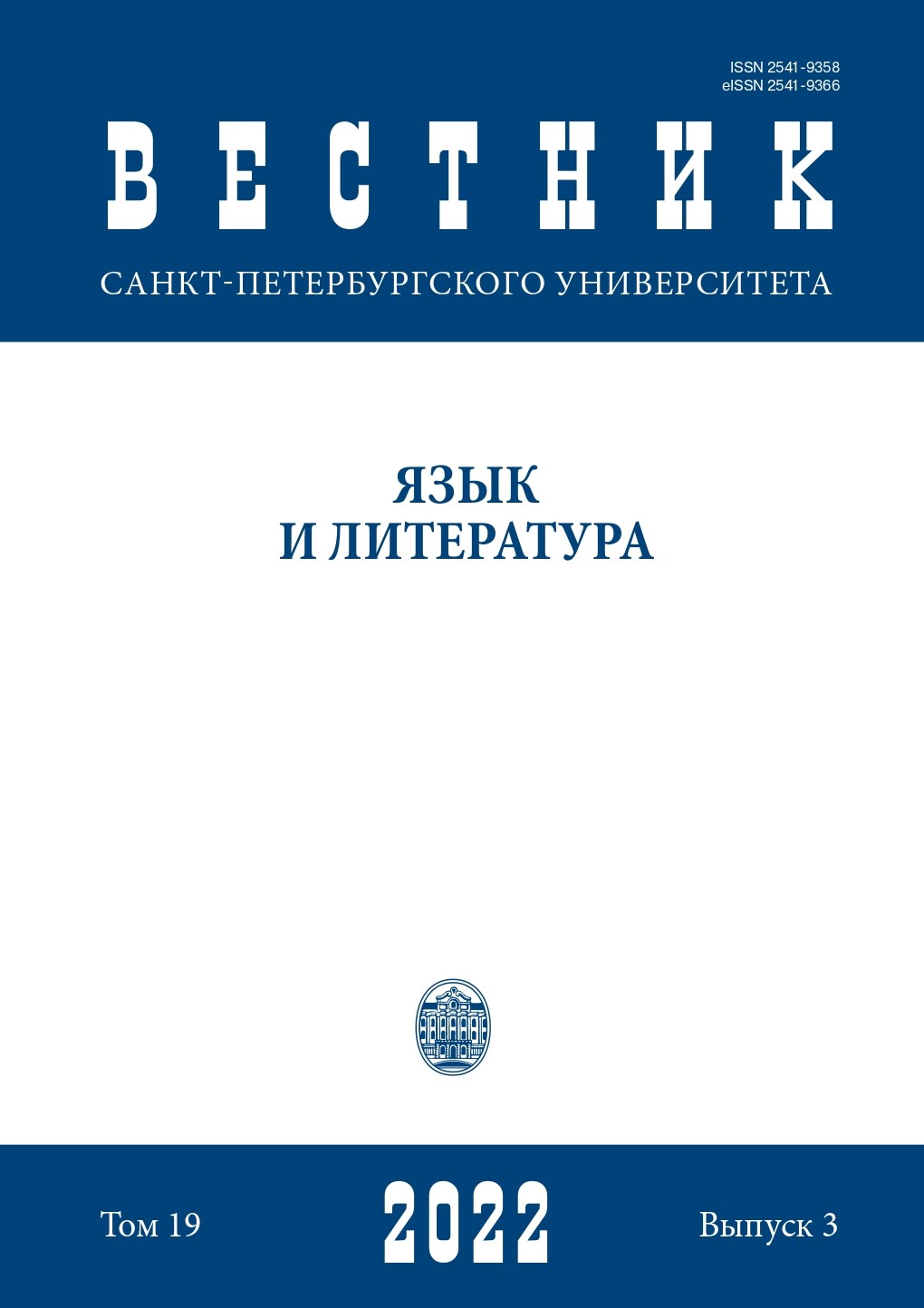The presence of the possible world of cinema text in the modern screenplay
DOI:
https://doi.org/10.21638/spbu09.2022.309Abstract
The article analyzes the presence of the possible world of film text in A.P.Zvyagintsev’s and O.I.Negin’s screenplay Dislike. This text for the first time became the subject of philological analysis using comparative and contextual-functional methods. The director’s published comments allow tracing the path from the literary screenplay itself to the film text. As a result of the sampling of linguistic material, which reveals the presence of the possible world of the film text in the script, the specificity of its categories (integrity, coherence, completeness, dynamics, etc.) was revealed. The possible world of cinema text determines the a priori variability and uncertainty of the script text. The article reflects the features of the scenario functioning of lexical-grammatical and syntactic language means. The screenplay and the film text are interdependent, but not identical entities. It has been established that the development of the technical parameters of the film text has an indirect effect on the film script. One of the aims of the study is to critically analyze the notions that the screenplay does not have the merits of a literary text. In the course of analyzing the presence of a possible world of film text, the working hypothesis was confirmed that a film script is a text with a motivated violation of communicative and pragmatic norms (accuracy, relevance, expressiveness). It represents a new type of text, the anomalies of which are due to its intended purpose for semiotic translation into cinematic text, the diverse nature of its receptive program.
Keywords:
screenplay, cinema text, possible worldpossible world, semiotic translation
Downloads
References
Адмони 1975 — Адмони В.Г. Содержательные и композиционные аспекты предложения. В кн.: Теоретические проблемы синтаксиса современных индоевропейских языков: сб. науч. тр.. Л.: Наука, 1975. С. 2–5.
Генис 1999 — Генис А.А. Иван Петрович умер. М.: Новое литературное обозрение, 1999.
Звягинцев 2020 — Звягинцев А.П. Предисловие. В кн. Звягинцев А.П., Негин О.И. и др. Сценарии кинофильмов Андрея Звягинцева. М.: Альпина нон-фикшн, 2020. С. 5–12.
Ильенко 2003 — Ильенко С.Г. Русистика. СПб.: Изд-во Рос. гос. пед. ун-та им. А.И.Герцена, 2003.
Каган 1972 — Каган М.С. Морфология искусства. Л.: Искусство, 1972.
Лотман 1992 — Лотман Ю.М. Культура и взрыв. М.: Гнозис, 1992.
Лотман 2005 — Лотман Ю.М. Об искусстве. СПб.: Искусство, 2005.
Мартьянова 2011 — Мартьянова И.А. Кинематограф русского текста. СПб.: Свое издательство, 2011.
Мартьянова 2014 — Мартьянова И.А. Текстообразующая роль киносценария в ретрансляции русской культуры. СПб.: Изд-во Рос. гос. пед. ун-та им. А.И.Герцена, 2014.
Мартьянова 2018 — Мартьянова И.А. Является ли сценарий черновиком кинотекста? В cб.: Киноапофатика: сб. науч. ст. СПб.: Петрополис, 2018. С. 236–249.
Негин 2020 — Негин О.И. Предисловие. В кн.: Звягинцев А.П., Негин О.И. и др. Сценарии кинофильмов Андрея Звягинцева. М.: Альпина нон-фикшн, 2020. С. 13–15.
Огудов 2020 — Огудов С.А. К проблеме мимесиса в нарратологии: визуальные аттракторы в советском киносценарии 1920–1930-х годов. Новое литературное обозрение. 2020, (3): https://www.nlobooks.ru/magazines/novoe_literaturnoe_obozrenie/163_nlo_3_2020/ (дата обращения: 17.08.2020).
Одинцов 1980 — Одинцов В.В. Стилистика текста. М.: Наука, 1980.
Пазолини 1989 — Пазолини П. Сценарий как структура, тяготеющая к иной структуре. Перевод с итал. Ямпольский М.Б. (пер. с ит.). Киносценарии. 1989, (4): 186–191.
Прянишникова 1983 — Прянишникова А.Д. О композиционной функции партитурности. Научные доклады высшей школы. Серия Филологические науки. 1983, (2): 74–77.
Тарковский 1967 — Тарковский А.А. Запечатленное время. Вопросы киноискусства. 1967, (10): 81–92.
Тынянов 1977 — Тынянов Ю.Н. Поэтика. История литературы. Кино. М.: Наука, 1977.
Хейфиц 1956 — Хейфиц И.Е. Монтаж — искусство сценариста. Вопросы кинодраматургии. 1956, (2): 21–66.
Шкловский 1985 — Шкловский В.Б. За 60 лет: Работы о кино. М.: Искусство, 1985.
Эйзенштейн 1964 — Эйзенштейн С.М. Избранные произведения. В 6 т. Т. 2. М.: Искусство, 1964.
Эко 1989 — Эко У. Заметки на полях «Имени розы». В кн.: Эко У. Имя розы. Костюкович Е.А. (пер. с фр.). М.: Книжная палата, 1989. С. 427–467.
Ямпольский 1982 — Ямпольский М.Б. Кино «тотальное» и «монтажное». Искусство кино. 1982, (7): 130–146.
Macdonald 2013 — Macdonald I.W. Screenwriting Poetics and the Screen Idea. Basingstoke: Palgrave Macmillan, 2013.
Price 2010 — Price S. The Screenplay. Authorship, Theory and Criticism. Basingstoke: Palgrave Macmillan, 2010.
Downloads
Published
How to Cite
Issue
Section
License
Articles of "Vestnik of Saint Petersburg University. Language and Literature" are open access distributed under the terms of the License Agreement with Saint Petersburg State University, which permits to the authors unrestricted distribution and self-archiving free of charge.






